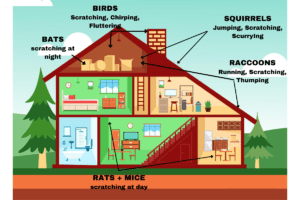

Hear Noise in the Attic – What Should I do?
You hear noise in the attic. It’s squeaking, scratching and chewing.
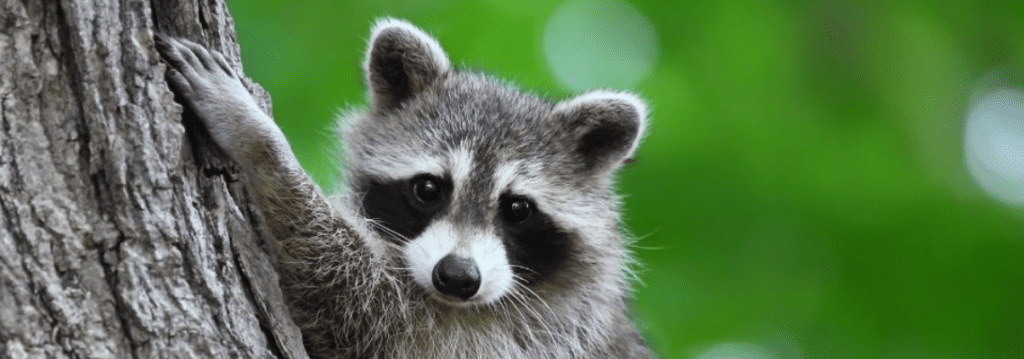

Adaptable to various environments, they thrive in wooded areas as well as urban settings.
These omnivores eat everything from fruits and nuts to small animals and trash.
Mating occurs in winter; females give birth to 2-5 kits after a 63-day gestation.
In Canada, the most common type of raccoon is the Northern Raccoon (Procyon lotor). These raccoons are versatile and can adapt to various environments, flourishing not only in the wild and rural settings but also in urban areas where they find abundant resources. This adaptability allows them to spread across a wide range of Canadian provinces, making them a familiar sight in both countryside and city landscapes.
Raccoons are notorious for their destructive habits in urban settings, where they scavenge trash, vandalize gardens, and can even cause structural damage to homes as they tear apart roof shingles or ventilators to access attics. Their tendency to nest in chimneys and sheds can lead to significant cleanup and repair costs, and they often disrupt ecosystems by preying on bird nests and other wildlife.
Raccoons are easily identifiable by their size, often reaching up to 95 cm in length including their bushy, ringed tail. They feature a distinctive “mask” of darker fur around their eyes, set against a primarily grey to reddish-brown body. Their agile front paws are almost hand-like, capable of opening jars and unlatching gates, which contributes to their reputation as clever and mischievous animals.
Raccoons should be taken seriously due to the various health risks they pose. They are carriers of diseases like rabies and raccoon roundworm, which can be transmitted to humans and pets. Additionally, their droppings can contaminate areas and pose a risk of disease. If raccoons frequent your property, it is crucial to handle the situation carefully, as they can become aggressive if threatened, especially when they have young with them. Professional wildlife control is recommended to safely address raccoon infestations.
Raccoons are attracted to areas with abundant food and shelter opportunities, which are plentiful in human habitats. Unsecured trash bins, pet food left outdoors, and accessible entry points to warm, safe nesting spots like attics or crawl spaces draw raccoons into residential areas. They may also seek refuge in homes during the colder months or when female raccoons seek safe places to give birth and raise their young.
To deter raccoons, secure all potential food sources by using wildlife-proof garbage cans, keeping pet food indoors, and cleaning up any fallen fruit from trees in your garden. Ensure that your home is secure by sealing any entry points, such as loose siding, eaves, and roof vents. Regularly inspecting and repairing any structural vulnerabilities can also prevent raccoons from gaining access to your home.
Pestcheck’s raccoon inspection involves a comprehensive examination of your property, focusing on common entry points like attics, basements, and crawl spaces. Our experts document all signs of raccoon activity and hiding spots. This thorough assessment helps us understand the extent of the problem and develop a targeted, effective plan to safely remove raccoons and prevent future invasions.
Pestcheck’s raccoon control strategy employs humane and environmentally responsible methods. Our trained staff use live traps to capture raccoons without harm, ensuring their safe removal from your property. We then sanitize affected areas to prevent further issues. Most importantly, all captured wildlife is released back into their natural habitats. This approach secures your property while maintaining our commitment to animal welfare.
Pestcheck’s follow-up services include regular inspections to monitor for any signs of returning raccoons. We reinforce exclusion measures and check for new entry points, adapting our strategies to seasonal changes. This proactive approach ensures continuous protection, keeping your home raccoon-free year-round and providing lasting peace of mind and security for your property.
Check out our blogs and articles to learn more about keeping your home pest-free and your family and pets safe! We’re sharing our expert advice and latest news from behind-the-scenes.


You hear noise in the attic. It’s squeaking, scratching and chewing.
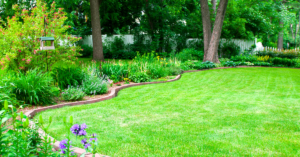

Pest control is an essential aspect of maintaining a healthy and comfortable home. However, traditional pest control methods often rely on chemical pesticides that can have negative effects on the
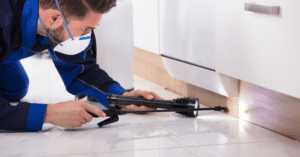

Pest control is an important aspect of maintaining a healthy and clean living environment. It involves the use of various methods to control or eliminate pests such as insects, rodents,
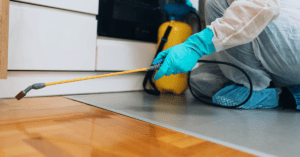

Pest control is a vital aspect of maintaining a safe and healthy environment for humans, pets, and plants. Pests can cause a variety of problems, including property damage, food contamination,
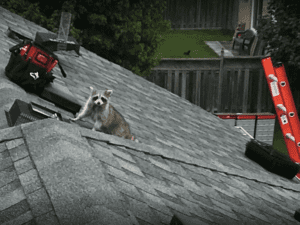

Read about when raccoons have babies. What you should do if they move into your home.
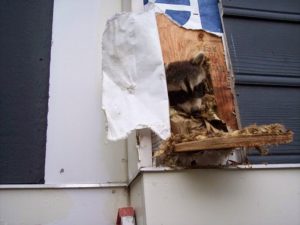

Evicting rats, squirrels or raccoons from the attic is a big process and it comes with some side effects. The process doesn’t end after eviction: there is still a major
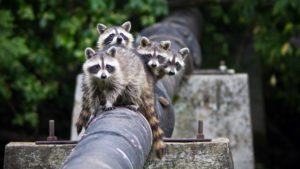

The Raccoon Nation in your yard can be a real problem. These urban scavengers are ravenously hungry and will happily eat almost anything. Raccoons have eaten potatoes out of gardens,
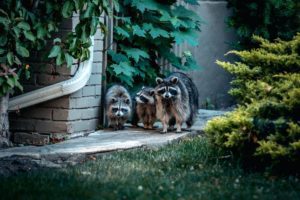

Vancouverites have a complicated relationship with these “mask bandits”. On one hand, raccoons appear adorable and are embraced as part of the city. On they other hand, their population has


If you encounter a pest control problem; rather than trying to control the infestation yourself, hire a professional pest control company. When you do need to hire a pest control
Mon: 9am to 5pm
Tue: 9am to 5pm
Wed: 9am to 5pm
Thu: 9am to 5pm
Fri: 9am to 5pm
Sat: 9am to 12pm
Sun: Closed
Stat Holiday: Closed
2381 Marine Drive,
West Vancouver, BC, V7V 1K9
#220 – 145 Chadwick Ct,
North Vancouver, BC, V7M 3K1
+1 (778) 909 1318